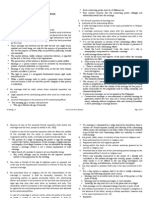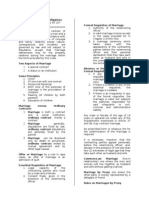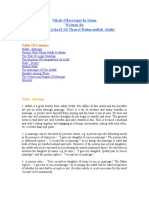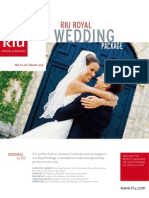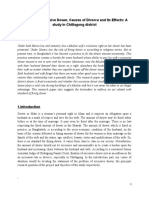law (1)
law (1)
Uploaded by
Layca BolontonCopyright:
Available Formats
law (1)
law (1)
Uploaded by
Layca BolontonCopyright
Available Formats
Share this document
Did you find this document useful?
Is this content inappropriate?
Copyright:
Available Formats
law (1)
law (1)
Uploaded by
Layca BolontonCopyright:
Available Formats
BOLONTON, LAYCA L.
FEBRUARY 13, 2024
BSED SOCIAL STUDIES – II LAW-REALTED STUDIES (SS26)
Coverage: Article 1-14 of the Family Code of the Philippines
1. Define marriage under the Family Code.
Marriage is a special contract of permanent union between a man and a woman entered
into in accordance with law for the establishment of conjugal and family life. It is the
foundation of the family and an inviolable social institution whose nature,
consequences, and incidents are governed by law and not subject to stipulation, except
that marriage settlements may fix the property relations during the marriage within the
limits provided by this Code.
2. What are the two aspects of marriage? Explain.
The two aspects of marriage are the personal aspect and the legal aspect. The personal
aspect involves the emotional, spiritual, and social union between the spouses, while
the legal aspect pertains to the rights, obligations, and responsibilities that come with
marriage under the law.
3. What are the essential requisites of a valid marriage?
(1) Legal capacity of the contracting parties who must be a male and a female; and
(2) Consent freely given in the presence of the solemnizing officer.
4. What are the formal requisites of marriage?
(1) Authority of the solemnizing officer,
(2) A valid marriage license except in the cases provided for in Chapter 2 of this Title;
and
(3) A marriage ceremony which takes place with the appearance of the contracting
parties before the solemnizing officer and their personal declaration that they take each
other as husband and wife in the presence of not less than two witnesses of legal age.
5. What are the effects of the following to a contract of marriage:
a. Absence of any of the essential or formal requisites?
The absence of any of the essential or formal requisites shall render the marriage void
ab initio, except as stated in Article 35 (2).
b. Defect in any of the essential requisites?
A defect in any of the essential requisites shall render the marriage voidable as
provided in Article 45.
c. Irregularity in the formal requisites?
An irregularity in the formal requisites shall not affect the validity of the marriage but the
party or parties responsible for the irregularity shall be civilly, criminally and
administratively liable.
6. What is the form prescribed by law for the marriage ceremony?
No prescribed form or religious rite for the solemnization of the marriage is required. It
shall be necessary, however, for the contracting parties to appear personally before the
solemnizing officer and declare in the presence of not less than two witnesses of legal
age that they take each other as husband and wife.
7. Who may contract marriage?
Any male or female of the age of eighteen years or upwards not under any of the
impediments mentioned in Articles 37 and 38, may contract marriage.
8. Is marriage by proxy, whether in the Philippines or abroad valid? Explain.
Marriage by proxy is not valid under Philippine law, whether conducted in the
Philippines or abroad. The presence of both parties during the ceremony is necessary
for validity.
9. Who may solemnize marriages?
(1) Any incumbent member of the judiciary within the court’s jurisdiction;
(2) Any priest, rabbi, imam, or minister of any church or religious sect duly authorized by
his church or religious sect and registered with the civil registrar general, acting within
the limits of the written authority granted him by his church or religious sect and
provided that at least one of the contracting parties belongs to the solemnizing officer’s
church or religious sect;
(3) Any ship captain or airplane chief only in the cases mentioned in Article 31;
(4) Any military commander of a unit to which a chaplain is assigned, in the absence of
the latter, during a military operation, likewise only in the cases mentioned in Article 32;
or
(5) Any consul-general, consul or vice-consul in the case provided in Article 10.
10. Explain the requirement of parental consent under our present marriage law. Is
the requirement indispensable for the validity of the marriage?
The rule on parental consent is found under Article 14 of the Family Code. It states that
in case either or both of the contracting parties are between the ages of eighteen and
twenty-one, they shall exhibit to the local civil registrar, the consent to their marriage of
their father, mother, surviving parent or guardian, or persons having legal charge of
them, in the order mentioned. Non-compliance with the requirement of parental consent
does not make the marriage invalid or void but merely annullable, which means that the
marriage is valid until annulled. As a result, a petition for the annulment of the marriage
may be filed by the parents, guardian or person having substitute parental authority over
the party seeking the annulment, in that order, unless after attaining the age of twenty-
one, such party freely cohabited with the other and both lived together as husband and
wife.
You might also like
- Wedding Reception ScriptDocument3 pagesWedding Reception Scriptlhyte80% (5)
- Family Code Reviewer - Tolentino FC 1-69Document13 pagesFamily Code Reviewer - Tolentino FC 1-69imanganda100% (2)
- Family Code ReviewerDocument65 pagesFamily Code Reviewerroansalanga96% (24)
- Bar Review Companion: Civil Law: Anvil Law Books Series, #1From EverandBar Review Companion: Civil Law: Anvil Law Books Series, #1No ratings yet
- Rituals Hinduism 1Document17 pagesRituals Hinduism 1api-305353805No ratings yet
- Similarities and Differences Between Japan and Philippine CultureDocument27 pagesSimilarities and Differences Between Japan and Philippine CultureLindsey LL71% (7)
- Programme Proper - Wedding Fenn and RhoyDocument4 pagesProgramme Proper - Wedding Fenn and RhoyMarcus AngelicumNo ratings yet
- Family CodeDocument50 pagesFamily CodeIan Yan100% (1)
- The Legal Aspect of MarriageDocument3 pagesThe Legal Aspect of MarriageLuna Faustino-LopezNo ratings yet
- Intro To MarriageDocument6 pagesIntro To MarriageClarkNo ratings yet
- The Legal Aspect of MarriageDocument9 pagesThe Legal Aspect of MarriageRicky James Laggui SuyuNo ratings yet
- Family Code Reviewer FINALSDocument3 pagesFamily Code Reviewer FINALSEnrryson SebastianNo ratings yet
- LRM Chapter 2 Family CodeDocument53 pagesLRM Chapter 2 Family CodeJoshua AseritNo ratings yet
- Family Code of The PhilippinesDocument16 pagesFamily Code of The PhilippinesNadine Malaya NadiasanNo ratings yet
- Family CodeDocument157 pagesFamily CodeCPPO 2nd Cotabato PMFCNo ratings yet
- Chapter 1 The Family Code Lesson 1Document11 pagesChapter 1 The Family Code Lesson 1Dominic BocoNo ratings yet
- Reviewer On Fam Code and Loc Gov CodeDocument8 pagesReviewer On Fam Code and Loc Gov CodeJessica VillabrilleNo ratings yet
- NotesDocument16 pagesNotesTalina BinondoNo ratings yet
- Pafr Midterm Exam Sample QuestionsDocument4 pagesPafr Midterm Exam Sample QuestionsAna BassigNo ratings yet
- The Family Code of The PhilippinesDocument3 pagesThe Family Code of The Philippinesgcaragan_makaniNo ratings yet
- Marriagelawppt 171112084816Document38 pagesMarriagelawppt 171112084816Chano Moreno100% (1)
- Persons and Family Relations - II. Family Relations)Document41 pagesPersons and Family Relations - II. Family Relations)IkkinNo ratings yet
- Family Code Ni IskoDocument65 pagesFamily Code Ni IskoIsko BrionNo ratings yet
- Marriage: Art. 1. Marriage Is A Special Contract of Permanent UnionDocument12 pagesMarriage: Art. 1. Marriage Is A Special Contract of Permanent Unionjovelyn davoNo ratings yet
- The Family Code of The PhilippinesDocument25 pagesThe Family Code of The PhilippinesMaria NgNo ratings yet
- A. 1-45 of The Family CodeDocument26 pagesA. 1-45 of The Family CodeSittie Hania A. SaripNo ratings yet
- Prelims Fam CodeDocument7 pagesPrelims Fam CodemmjimapiscayNo ratings yet
- 11.09.13AM Family Code (Atty. Raymond B. Batu)Document18 pages11.09.13AM Family Code (Atty. Raymond B. Batu)Miggy Zurita100% (1)
- Title I Marriage Chapter 1. Requisites of Marriage: Abdul - o - 1 - 1Document5 pagesTitle I Marriage Chapter 1. Requisites of Marriage: Abdul - o - 1 - 1AbdulRafiONo ratings yet
- ALCANTARA Marriage Under The Philippine Law and Void-Voidable MarriageDocument10 pagesALCANTARA Marriage Under The Philippine Law and Void-Voidable MarriageAlfred AtalinNo ratings yet
- Family CodeDocument105 pagesFamily CodeMiguel Gutierrez100% (2)
- Civ Rev Assign CompleteDocument25 pagesCiv Rev Assign CompleteVanessa Evans CruzNo ratings yet
- Term Paper - Marriage and Its RequisitesDocument8 pagesTerm Paper - Marriage and Its RequisitesJai Noreena BaliliNo ratings yet
- Family Code-RabuyaDocument21 pagesFamily Code-RabuyaKathleen Joy80% (10)
- 2nd Exam Review NotesDocument12 pages2nd Exam Review NotesMaria Biena May BiolNo ratings yet
- Family Code Reviewer FINALSDocument60 pagesFamily Code Reviewer FINALSJiselle CompuestoNo ratings yet
- Reviewer-Family CodeDocument30 pagesReviewer-Family CodeNimpa PichayNo ratings yet
- Marriage Peace EdDocument7 pagesMarriage Peace EdheeseungsaomNo ratings yet
- Requisites of MarriageDocument3 pagesRequisites of MarriageNimpa Pichay100% (1)
- Family CodeDocument216 pagesFamily CodeCarol Jacinto100% (1)
- AnnulmentDocument16 pagesAnnulmentRogelyn Parale MalaluanNo ratings yet
- XamDocument3 pagesXamPatrick SevenNo ratings yet
- The Family Code of The PhilippinesDocument2 pagesThe Family Code of The PhilippinesXianLaoNo ratings yet
- Civil Law Rev Assignment 1Document25 pagesCivil Law Rev Assignment 1Cecille De VeraNo ratings yet
- The Family Code of The Philippines: Reality Mae S. TaberneroDocument24 pagesThe Family Code of The Philippines: Reality Mae S. TaberneroMaria NgNo ratings yet
- Reviewer Family Code Articles 1-40Document7 pagesReviewer Family Code Articles 1-40Cristhian Rey BotorNo ratings yet
- Family Code YnahDocument23 pagesFamily Code YnahCMLNo ratings yet
- Family Code of The PhilippinesDocument36 pagesFamily Code of The PhilippinesAriz VillaruelNo ratings yet
- Family CodeDocument11 pagesFamily CodejanmczealNo ratings yet
- Midterm - Persons and Family RelationsDocument21 pagesMidterm - Persons and Family RelationsLing Escalante100% (2)
- Civil Review Notes On MarriageDocument6 pagesCivil Review Notes On MarriageDelbert BaguilatNo ratings yet
- Civil Review I - NotesDocument3 pagesCivil Review I - NotesvalyNo ratings yet
- Family Code in The PhilippinesDocument55 pagesFamily Code in The Philippinesinvictus0446No ratings yet
- Family Code of The PhillppinesDocument12 pagesFamily Code of The PhillppinesRostomPiraCastuerasNo ratings yet
- MarriageDocument30 pagesMarriageajajaNo ratings yet
- PFL Concepts Second ExamDocument39 pagesPFL Concepts Second ExamribahjinNo ratings yet
- Handouts 2 in Tle MFRDocument11 pagesHandouts 2 in Tle MFRJean EquizNo ratings yet
- Void Ab Initio MarriagesDocument5 pagesVoid Ab Initio Marriagescmge_2005No ratings yet
- Family Code ReviewerDocument3 pagesFamily Code ReviewerRhea PolintanNo ratings yet
- Case Digest - Week 2Document4 pagesCase Digest - Week 2Van John MagallanesNo ratings yet
- Persons and Family Relations - Marriage and Its RequisitesDocument109 pagesPersons and Family Relations - Marriage and Its RequisitesJeNovaNo ratings yet
- Articles 1-44, FCDocument10 pagesArticles 1-44, FCjuliasanjose.lawNo ratings yet
- General Principles of the Civil Law of the People's Republic of ChinaFrom EverandGeneral Principles of the Civil Law of the People's Republic of ChinaNo ratings yet
- Cookery 10-Module 3 Cookery 10 - Module 3Document23 pagesCookery 10-Module 3 Cookery 10 - Module 3RACHELE GAMOSNo ratings yet
- Human Reproduction 2 (1)Document8 pagesHuman Reproduction 2 (1)Layca BolontonNo ratings yet
- CHAPTER6Document6 pagesCHAPTER6Layca BolontonNo ratings yet
- Love Yourself Campaign ShortDocument2 pagesLove Yourself Campaign ShortLayca BolontonNo ratings yet
- Better Youth ShortDocument2 pagesBetter Youth ShortLayca BolontonNo ratings yet
- Syllabus Persons and Family RelationsDocument8 pagesSyllabus Persons and Family Relationsdominicci2026No ratings yet
- Section 1 - 4. Secret Wealth Vs For Richer, For PoorerDocument7 pagesSection 1 - 4. Secret Wealth Vs For Richer, For PoorerQuốc Bảo PhạmNo ratings yet
- LLB 3 Y 1st Sem Family Law (English)Document32 pagesLLB 3 Y 1st Sem Family Law (English)shaivalNo ratings yet
- Nikah (Marriage) in Islam Written by Maulana Ashraf Ali Thanvi Rahmatullah AlaihiDocument24 pagesNikah (Marriage) in Islam Written by Maulana Ashraf Ali Thanvi Rahmatullah AlaihiMuaaz WaseemNo ratings yet
- Marriage Laws in India - An Analysis of Legal Solemnization of Marriages - IpleadersDocument11 pagesMarriage Laws in India - An Analysis of Legal Solemnization of Marriages - IpleadersVaishnavi ChoudharyNo ratings yet
- Canonical PreparationsDocument3 pagesCanonical PreparationsKyle BanceNo ratings yet
- Riu Wedding PackageDocument2 pagesRiu Wedding Packageapi-188654655No ratings yet
- Case FilesDocument4 pagesCase FilesAshish DavessarNo ratings yet
- THE DESTROYER - ScriptDocument13 pagesTHE DESTROYER - Scriptflorence leivonNo ratings yet
- Marriage LicenseDocument2 pagesMarriage LicenseZhelNo ratings yet
- Pages From Manual - of - Hindu - Marriage-10Document1 pagePages From Manual - of - Hindu - Marriage-10avisek_basuNo ratings yet
- Course Outline On Persons and Family Relations (1819-1) PDFDocument6 pagesCourse Outline On Persons and Family Relations (1819-1) PDFLyssa MurosNo ratings yet
- Hindu LawDocument18 pagesHindu LawSyed Imran AdvNo ratings yet
- LLB 1 Sem Family Law 1 Hindu Law p4 7507 Summer 2019Document2 pagesLLB 1 Sem Family Law 1 Hindu Law p4 7507 Summer 2019FULCHAND DANGENo ratings yet
- Divorce Should Not Be Legalized (Please Search and Make More Explanations For This)Document8 pagesDivorce Should Not Be Legalized (Please Search and Make More Explanations For This)Emerey MendezNo ratings yet
- Absolute Divorce Bill Gets Nod of House PanelDocument3 pagesAbsolute Divorce Bill Gets Nod of House Panelnut_crackreNo ratings yet
- April Is in My Mistress FaceDocument2 pagesApril Is in My Mistress FaceDosiitaNo ratings yet
- CivRev QAsDocument3 pagesCivRev QAsVanessa Evans CruzNo ratings yet
- Vietnamese Wedding: Le An Hoi (Betrothal Ceremony)Document4 pagesVietnamese Wedding: Le An Hoi (Betrothal Ceremony)cnminh74No ratings yet
- Ancillary OrdersDocument99 pagesAncillary OrdersAriza SaidNo ratings yet
- Marriage & Family: I Family As InstitutionDocument5 pagesMarriage & Family: I Family As InstitutionShelly BhattacharyaNo ratings yet
- Fixation of Excessive DowerDocument63 pagesFixation of Excessive DowerToma ChowdhuryNo ratings yet
- Dalmas Otieno Marries Third Wife (CLS - 305 - Family Law)Document2 pagesDalmas Otieno Marries Third Wife (CLS - 305 - Family Law)edith chepkemoiNo ratings yet
- WEDDING - Program FormatDocument2 pagesWEDDING - Program FormatKarra Angeline Yatco VivoNo ratings yet
- Divorce Procedures and Laws in PakistanDocument6 pagesDivorce Procedures and Laws in PakistanSanaNo ratings yet
- Maintenance of Wife, Children and Dependable: BY-Parth BhutaDocument21 pagesMaintenance of Wife, Children and Dependable: BY-Parth BhutaSumanth RoxtaNo ratings yet


